Neurodiversity information for parents and young people
Why it is important to use fortified dairy alternatives
- Dairy is a key food group for children. It is a naturally rich source of calcium, iodine, calories and protein.
- Calcium is essential for healthy development of bones, teeth and cells. Lack of calcium can cause bone deformity and fits.
- Iodine is required to form the hormone thyroxine which helps convert food into energy. It also helps with mental and physical development. Lack of iodine can affect brain development.
- Dairy substitutes which are fortified with calcium and iodine are necessary if your child cannot consume dairy products.
- Note that some dairy substitutes are not fortified and some are low in protein or energy.
- Note that most organic or “clean” products are not fortified.
- Try to include a variety of dairy substitute products, for example dairy free cheese or yogurt alternatives. This may help to give your child an appealing mix of foods so they can enjoy their meals.
We cannot list every single product available in shops. Supermarket own brands are often suitable. Always check the label before you buy.
What to look out for
Always check the label before you buy.
Try to choose products that are fortified with calcium.
Ideally they will use 120mg calcium per 100ml of product.
Dairy alternatives
Use the drop-down menus for information on dairy-free products to buy.
- Soya, oat and pea provide higher energy (calorie) and protein content.
- Barista and growing up versions also provide a higher calorie content. These may be better suited for children up to 2 years of age.
- The most environmentally sustainable ‘milk’ options are oat and pea.
Oat
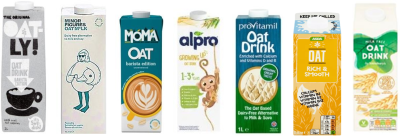
Left to right: Oatly Oat Barista, Minor Figures Barista Oat, Moma Oat Barista, Alpro Growing Up Oat, Asda Oat, Provitamil Oat, Sainsbury’s Oat
Soya
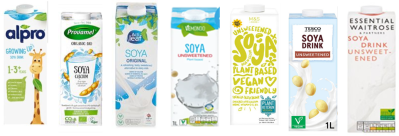
Left to right: Alpro Growing Up Soya, Provamel Soya Calcium, Aldi Actileaf Soya, Lidl Soya, M&S Soya, Tesco Soya, Waitrose Soya
Pea
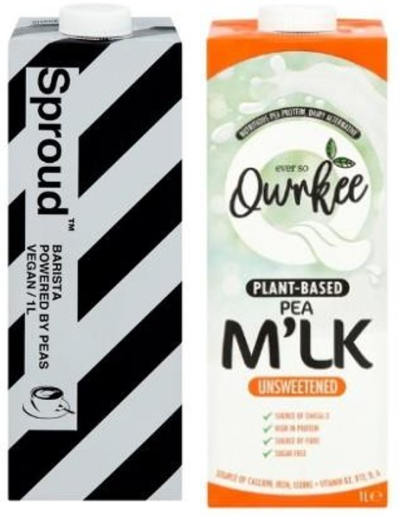
Left to right: Sproud Barista, Qwrkee Pea
Potato
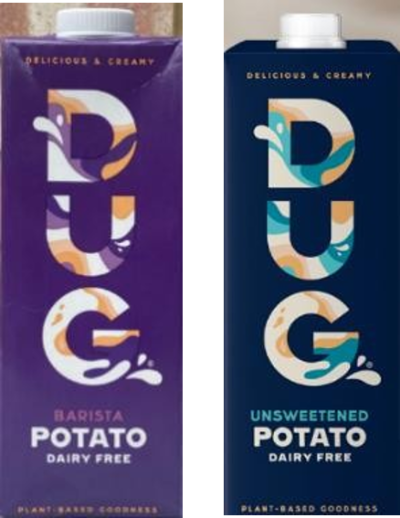
Left to right: Dug Barista, Dug Unsweetened
Coconut
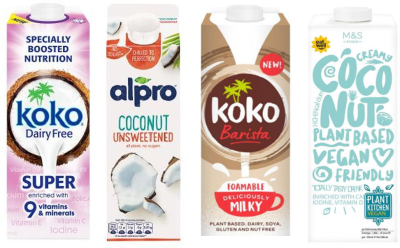
Left to right: Koko Super, Alpro Coconut, Koko Barista, M&S Coconut
Almond
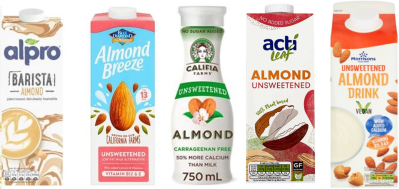
Left to right: Alpro Barista Almond, Almond Breeze, Califia Farms Almond, Aldi Actileaf Almond, Morrisons Almond
Other nut and rice milks

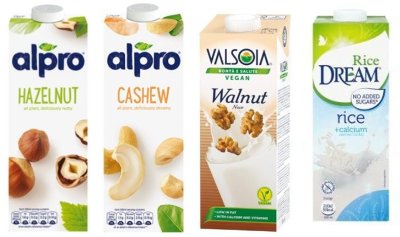
Left to right: Alpro Hazelnut, Alpro Cashew, Valsoia Walnut, Rice Dream + Calcium
Soya

Left to right: Alpro Soya Greek, Alpro Plain, Asda Plain Soya, Tesco Plant Chef Soya
Coconut

Left to right: Koko Plain, Koko Greek Style, Koko Coconut, Little Bandits Flavoured
Oat
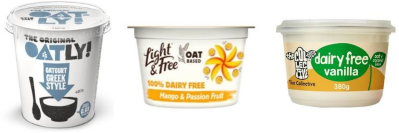
Left to right: Oatly Greek Style, Light & Free Flavoured, The Collective Oat and Coconut
Cheddar style

Left to right: Koko Cheddar, Applewood Vegan, Asda Free From Cheddar
Mozzarella style
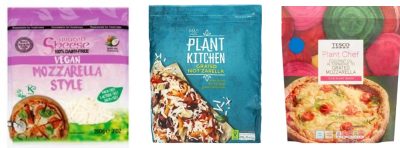
Left to right: Sheese Mozzarella Style, M&S Plant Kitchen Not’zarella, Tesco Plant Chef mozzarella
Soft cheese
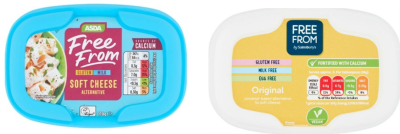
Left to right: Asda Free From soft cheese, Sainsbury’s Free From soft cheese

Dairy free spreads

Left to right: Vitalite, Pure Olive, Flora Plant Buttter, Violife Vioblock

Dairy free creams
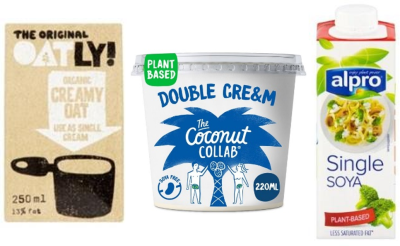
Left to right: Oatly Creamy Oat, Coconut Collab Double Cream, Alpro Single Soya Cream
Dairy free baby rice and porridge

Left to right: Holle Organic Oat, Organix Porridge, HIPP Organic Baby Rice, Ella’s Kitchen Porridge
Custard (does contain calcium)
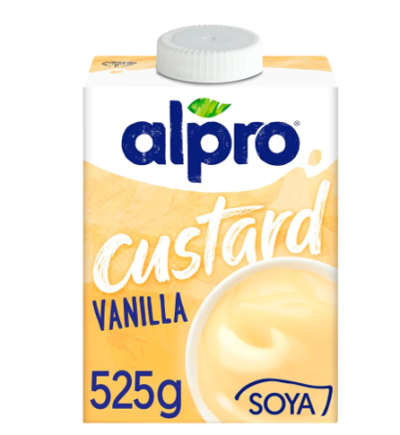
Alpro Vanilla Soya Custard
Custards (do not contain calcium)
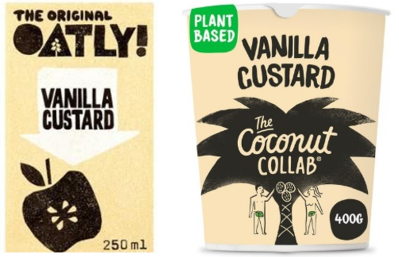
Left to right: Oatly Vanilla Custard, Coconut Collab Custard
Desserts and pudding pots (do contain calcium)

Left to right: Petits Filous Dairy Free, Coconut Collab Smoothie, Alpro Chocolate Dessert
Desserts and pudding pots (do not contain calcium)

Left to right: Ella’s Kitchen Dairy Free Rice Pudding, Over the Spoon Chocolate Pots, Coconut Collab Rice Pudding
Ice creams (do not contain calcium)

Left to right: Valsoia Vegan Tiramisu, Swedish Glace Vanilla, Valsoia Vegan Gelato, Booja Booja
Chocolate items (do not contain calcium)
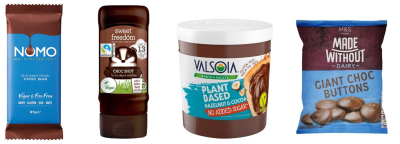
Left to right: Nomo choc bar, Sweet Freedom Choc Shot, Valsoia Hazelnut and Cocoa Spread, M&S Made Without chocolate buttons
Other (non dairy) allergies
- Some children have multiple food allergies, for example tree nuts (such as almonds or cashews), or coconut, soya or pea allergies. If your child has multiple food allergies, make sure you select an option that does not contains these allergens.
- By law, all ingredients contained in a product must be listed on the ingredient list section of the food label. Allergens such as tree nuts and soya should be clearly listed in bold or in italic.
Are calcium fortified dairy alternatives suitable as main ‘milk’ for my baby?
No they are not suitable. Only breast milk or formula can be used as main ‘milk’ until your baby is 1 year old.
However, you can introduce calcium-fortified dairy substitutes in food preparation before your baby is 1 year old. Try to choose products with a higher energy and protein content (for example ‘barista’ products).
You can use them to do the following:
- make a white sauce
- poach some fish
- add to porridge
- make a pancake.
When your baby is more than 1 year old
- If your baby is 1 year old, and is eating a varied diet and growing well, you can use calcium fortified dairy products as their main ‘milk’.
Important
If your baby or child is aged between 1 and 3 years old, they need 300ml of calcium fortified milk every day to meet their full calcium needs.
More information
Contact information
Paediatrics Dietetics Administrator, Monday to Friday (voicemails are checked daily)